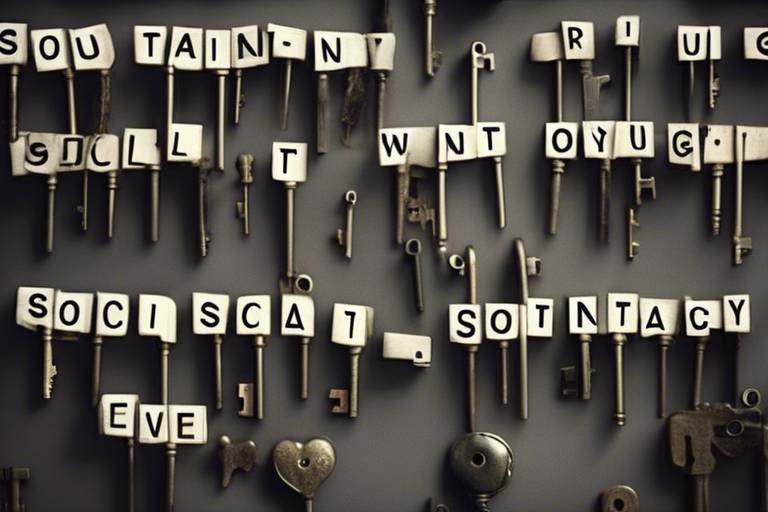Metaphysics - Transcending the Physical and Spiritual Realms
Metaphysics, a term that often evokes curiosity and intrigue, is a branch of philosophy that dives deep into the questions surrounding existence and reality. Imagine standing at the edge of a vast ocean, where the waves of thought crash against the shore of understanding. This is where metaphysics resides, exploring what lies beyond the tangible world we see and feel. It seeks to answer profound questions like, "What is the nature of reality?" and "What does it mean to exist?" As we embark on this philosophical journey, we will unravel the complexities of metaphysics, its historical evolution, and its significance in our quest to comprehend the universe.
The nature of reality is a captivating aspect of metaphysics that invites us to ponder the very essence of existence. What does it mean to be? Various philosophical perspectives have emerged over centuries, each offering unique insights into the fabric of reality. Some argue that reality is purely physical, a construct of matter and energy, while others propose that it encompasses a spiritual dimension that transcends our sensory experiences. Metaphysics acts as a bridge, connecting these realms and providing a framework for understanding the multifaceted nature of being. It's like trying to solve a puzzle where the pieces are constantly shifting, yet each piece contributes to the bigger picture of existence.
At the heart of metaphysical inquiry lie several key concepts that serve as building blocks for deeper philosophical exploration. Understanding these concepts is akin to having a map for a complex landscape. Among the most essential are ontology, the study of being; epistemology, the investigation of knowledge; and causation, which examines the relationships between events and their causes. Each of these concepts invites us to question our assumptions and expand our understanding of reality.
Ontology, a fascinating branch of metaphysics, focuses on the nature and organization of being. It delves into questions about existence itself: What does it mean to exist? What categories of entities populate our reality? Think of ontology as the blueprint of a house, detailing the structure and materials that make it whole. Key theories within ontology include debates around substance and accident, as well as the discussion of universals and particulars.
In the realm of ontology, the distinction between substance and accident is pivotal. A substance is something that exists independently and has a distinct identity, like a tree or a rock. In contrast, accidents are properties or characteristics that can change without altering the essence of the substance. For example, the color of a car is an accident; it can be painted a different color without changing the fact that it is still a car. This distinction helps us navigate our understanding of objects and their properties within the metaphysical framework.
The debate between universals and particulars adds another layer of complexity to our understanding of reality. Universals are general concepts or properties that can apply to multiple entities, such as the idea of "redness" that can be found in different red objects. Particulars, on the other hand, refer to individual entities, like a specific apple. This discussion shapes our understanding of categories and individual entities, prompting us to consider how we classify and relate to the world around us.
Epistemology, the study of knowledge and belief, is another crucial aspect of metaphysical inquiry. It examines how we acquire knowledge, what constitutes justified belief, and the limits of human understanding. Think of epistemology as a lens through which we view the world; it influences how we interpret our experiences and make sense of reality. As we navigate through life, our beliefs and knowledge shape our perceptions, making epistemology an essential component of metaphysical exploration.
The evolution of metaphysical thought is a rich tapestry woven through history, showcasing the contributions of various thinkers and movements. Understanding these historical perspectives is like tracing the roots of a tree, revealing how past ideas have shaped contemporary metaphysical discussions. From ancient philosophers to modern thinkers, each has left an indelible mark on the landscape of metaphysics.
Ancient philosophers like Plato and Aristotle laid the groundwork for metaphysical inquiry. Plato's Theory of Forms proposed that beyond our physical world lies a realm of perfect, abstract forms that represent the true essence of things. Aristotle, on the other hand, focused on substance and essence, arguing that understanding the nature of things requires examining their properties and causes. Their foundational ideas continue to resonate in contemporary metaphysical discussions, serving as a springboard for further exploration.
The transition to modern metaphysics brought forth influential thinkers such as René Descartes and Immanuel Kant. Descartes famously declared, "I think, therefore I am," emphasizing the role of consciousness in understanding existence. Kant challenged previous notions by introducing the idea that our perceptions shape our understanding of reality, thus blurring the lines between the observer and the observed. Their contributions have sparked ongoing debates regarding reality and existence, pushing the boundaries of metaphysical thought.
- What is metaphysics? Metaphysics is a branch of philosophy that explores the fundamental nature of reality, existence, and the relationships between entities.
- Why is metaphysics important? It helps us understand the deeper aspects of existence and reality, guiding our philosophical inquiries and shaping our worldview.
- Who are some key figures in metaphysics? Notable figures include Plato, Aristotle, René Descartes, and Immanuel Kant, each contributing significantly to the field.

The Nature of Reality
Have you ever found yourself staring at the night sky, pondering the vastness of the universe and your place within it? The question of reality is as old as humanity itself, and it's one that has sparked countless debates among philosophers, scientists, and curious minds alike. At its core, metaphysics dives deep into the fundamental questions of existence. What really is reality? Is it merely what we can see and touch, or is there something more profound lurking beneath the surface?
Metaphysics challenges us to consider various philosophical perspectives that attempt to explain the nature of being. Some argue that reality is a construct of our perceptions, while others believe it exists independently of our awareness. This duality leads us to explore two major realms: the physical and the spiritual. The physical realm is what we can measure and observe with our senses; it's the world of atoms, molecules, and the laws of physics. On the other hand, the spiritual realm encompasses the ideas, beliefs, and experiences that transcend the tangible world. It raises questions like, do our thoughts have a reality of their own? Are emotions merely chemical reactions, or do they hold a deeper significance?
To navigate these complex waters, metaphysics employs various theories and frameworks. Think of it as a toolbox filled with instruments designed to dissect and analyze the essence of reality. For instance, idealism posits that reality is fundamentally mental, while realism asserts that the physical world exists independently of our perceptions. Each of these perspectives offers a lens through which we can examine our understanding of existence.
Moreover, metaphysical inquiries often lead us to challenge our assumptions about what is possible. Consider the concept of multiverses, which suggests that there may be countless parallel realities existing simultaneously. This idea isn't just the stuff of science fiction; it invites us to rethink the very fabric of reality. Are we alone in our experiences, or are there infinite versions of ourselves living out different choices and circumstances?
In this exploration, we must also confront the limitations of human understanding. Our brains, while remarkable, are still bound by the constraints of our sensory experiences and cognitive capabilities. This leads to the realization that our grasp of reality may be inherently flawed or incomplete. As we delve deeper into metaphysics, we start to see that the nature of reality is not just a philosophical puzzle to be solved; it is an ever-evolving dialogue that challenges us to expand our horizons and embrace the mysteries of existence.
Ultimately, the nature of reality is a profound inquiry that intertwines with our daily lives. Whether you're an aspiring philosopher or simply someone who enjoys contemplating the universe, these questions invite us to look beyond the surface and seek a deeper understanding of our existence. So, the next time you find yourself lost in thought, remember that you are part of a grand conversation that has been unfolding for centuries, and your voice matters in the ongoing quest to comprehend the nature of reality.
- What is metaphysics? Metaphysics is a branch of philosophy that explores the fundamental nature of reality, including concepts like being, existence, and the universe.
- How does metaphysics differ from physics? While physics focuses on the empirical and measurable aspects of the universe, metaphysics delves into the underlying principles and questions that govern existence.
- Can metaphysics answer questions about the afterlife? Metaphysical inquiries often address existential questions, including those about life after death, but definitive answers remain elusive and subjective.
- Why is understanding the nature of reality important? Understanding reality helps us navigate our experiences, beliefs, and interactions with the world, fostering deeper connections and insights.

Key Philosophical Concepts
When we dive into the depths of metaphysics, we encounter a myriad of philosophical concepts that serve as the bedrock for understanding existence and reality. These concepts are not just abstract ideas; they are the lenses through which we examine our world and our place within it. Among the most pivotal of these concepts are ontology, epistemology, and causation. Each of these areas opens the door to profound questions about what it means to be, to know, and to understand.
Let’s start with ontology, the study of being. Ontology asks the fundamental question: What exists? It delves into the categories of entities and their relationships. Imagine walking through a forest. Each tree, rock, and animal represents a different kind of being. Ontology helps us categorize these entities and understand their essence. For instance, we might classify them as living or non-living, tangible or intangible. This classification is crucial because it shapes how we interact with the world around us.
Within ontology, we encounter debates that challenge our understanding of existence itself. One such debate is between substance and accident. A substance is something that exists independently, while an accident refers to properties or attributes that can change without altering the essence of the substance. For example, consider a beautiful painting. The canvas and paint are the substance, while the colors and shapes are accidents. This distinction helps us to grasp how objects can possess various characteristics while remaining fundamentally the same.
To illustrate this further, let’s consider a table. The table itself is the substance, while its color, size, and texture are accidents. If we paint the table blue, we haven’t changed what the table is; we’ve simply altered one of its properties. This understanding is vital in metaphysics, as it allows us to dissect the nature of objects and their inherent qualities.
Another intriguing aspect of ontology is the debate between universals and particulars. Universals are general concepts or properties that can be shared by multiple entities, like the color red or the idea of beauty. In contrast, particulars are the specific instances of those universals, such as a particular red apple or a unique painting. This distinction raises questions about how we categorize and understand the world. Are universals real, existing independently of the particulars, or are they merely names we give to shared characteristics?
Moving on to epistemology, the study of knowledge, we find ourselves pondering how we know what we know. Epistemology explores the nature of belief, justification, and the limits of human understanding. It poses questions like: What is knowledge? How do we justify our beliefs? Can we truly know anything at all? This branch of metaphysics is essential because it directly influences our approach to learning and understanding the world around us.
To illustrate, consider the classic example of the Gettier problem, which challenges the notion that justified true belief constitutes knowledge. Imagine you see a friend standing under a tree, and you believe they are waiting for you. However, unbeknownst to you, that person has left, and the person under the tree is a stranger. Your belief was justified and true, but was it knowledge? This paradox highlights the complexities of epistemology and how our understanding of knowledge is continually evolving.
In summary, the key philosophical concepts of ontology and epistemology provide a framework for exploring the deeper questions of existence and knowledge. They invite us to consider not just what is real, but how we come to understand that reality. As we navigate through life, these concepts serve as guiding stars, illuminating the path toward greater understanding and insight.
- What is metaphysics? Metaphysics is a branch of philosophy that explores the fundamental nature of reality, including concepts such as being, existence, and the universe.
- What is ontology? Ontology is the study of being and existence, examining the categories of entities and their relationships.
- What does epistemology focus on? Epistemology focuses on the nature of knowledge, belief, and justification, exploring how we know what we know.
- Why are substance and accident important? Understanding substance and accident helps clarify how objects possess properties and how those properties can change without altering the essence of the object.

Ontology: The Study of Being
Ontology, often described as the study of being, dives deep into the fundamental nature of existence itself. It’s like peeling back the layers of an onion, where each layer reveals more about what it means to exist. Think about it: when you ponder the question, "What is there?" you’re engaging in ontological inquiry. This branch of metaphysics is not just about what exists, but also about how these entities are categorized and related to one another. It challenges us to consider the very fabric of reality and how we interpret it.
At its core, ontology examines several key questions: What does it mean to be? What categories of being exist? Are there different kinds of existence? These questions are crucial as they form the foundation of our understanding of reality. For instance, consider the distinction between concrete objects, like a tree or a car, and abstract concepts, like love or justice. Ontology helps us navigate these waters, allowing us to classify and understand the myriad forms of existence that populate our universe.
One of the major debates within ontology revolves around the concepts of substance and accident. Substance refers to what something is fundamentally—its essence—while accidents are the properties that can change without altering the essence of the substance. For example, a red apple is still an apple even if it changes color to green. Understanding this distinction can help clarify how we view objects and their inherent qualities. Here’s a simple comparison:
| Concept | Definition | Example |
|---|---|---|
| Substance | The essential nature of an entity | An apple as an apple |
| Accident | Properties that can change without altering essence | The color of the apple |
Another important aspect of ontology is the debate between universals and particulars. Universals are the general qualities or properties that can be shared by multiple entities, such as the color red or the concept of beauty. Particulars, on the other hand, are individual entities that possess these qualities, like a specific red apple or a unique painting. This dichotomy raises intriguing questions about how we categorize and understand the world around us. Are universals merely names we give to groups of particulars, or do they exist in their own right? This ongoing debate illustrates the complexity of ontological discussions.
Ultimately, ontology serves as a vital framework for understanding existence. It challenges us to think critically about the nature of reality and encourages us to explore the relationships between different types of being. By engaging with ontological questions, we not only deepen our philosophical understanding but also enrich our everyday experiences as we navigate a world filled with diverse entities and concepts.
- What is ontology? Ontology is the branch of metaphysics that studies the nature of being, existence, and the categories of entities.
- Why is ontology important? Ontology helps us understand the fundamental nature of reality and how different entities relate to each other.
- What is the difference between substance and accident? Substance refers to what an entity fundamentally is, while accidents are properties that can change without altering its essence.
- What are universals and particulars? Universals are general qualities shared by multiple entities, while particulars are individual entities that possess these qualities.

Substance vs. Accident
In the realm of metaphysics, the distinction between substance and accident is pivotal for understanding the nature of objects and their properties. Imagine a beautiful vase sitting on a table; the vase itself can be considered a substance, while its color, shape, and texture are regarded as accidents. This distinction helps us navigate the complex interplay between what something is fundamentally and the traits it may exhibit. The vase, regardless of its color or design, remains a vase, showcasing how substance provides the essential identity of an object.
To delve deeper, substance refers to what a thing fundamentally is. It is the core essence that defines an entity, independent of its external characteristics. In contrast, accidents are the properties or attributes that can change without altering the fundamental nature of the substance. For instance, if our vase were to change color from blue to red, it would still be recognized as a vase; thus, the change is merely an accident. This distinction raises intriguing questions about the permanence of identity and the nature of change itself.
Historically, philosophers like Aristotle emphasized this distinction, positing that substances are the primary realities, while accidents are secondary. He categorized substances into categories like primary substances (individual entities) and secondary substances (species and genera). This classification allows us to understand how entities relate to one another within the metaphysical framework. For example, a particular tree (a primary substance) belongs to the category of trees (a secondary substance), and its height or leaf color are accidents that can vary.
In contemporary discussions, this distinction remains relevant, especially in fields such as ontology and philosophy of language. Philosophers often debate whether accidents can exist independently of substances or if they are merely descriptors that rely on the existence of a substance. This ongoing discourse invites us to ponder profound questions: Can an object exist without its properties? What happens to identity when accidents change?
To illustrate the substance-accident relationship further, consider the following table that highlights key differences:
| Aspect | Substance | Accident |
|---|---|---|
| Definition | The fundamental essence of an entity. | Properties or attributes of an entity. |
| Changeability | Generally unchanging; defines identity. | Can change without altering the substance. |
| Examples | A tree, a person, a car. | Height, color, weight. |
Ultimately, the exploration of not only enriches our understanding of metaphysics but also invites us to reflect on the nature of reality itself. As we navigate our experiences and the world around us, recognizing the distinction between what is essential and what is merely incidental can profoundly impact our philosophical inquiries and everyday perceptions.
- What is the difference between substance and accident?
Substance refers to the essential nature of an entity, while accidents are the properties that can change without affecting the entity's core identity. - Can an accident exist without a substance?
No, accidents are dependent on substances; they cannot exist independently. - Who were the key philosophers discussing substance and accident?
Aristotle is one of the most notable philosophers who emphasized the distinction between substance and accident in his works. - Why is this distinction important in metaphysics?
Understanding this distinction helps clarify how entities relate to their properties and the nature of identity and change.

Universals and Particulars
In the realm of metaphysics, the debate between universals and particulars is as captivating as it is complex. At its core, this discussion seeks to unravel the nature of properties and how they relate to individual entities. Universals refer to the general qualities or attributes that can be shared by multiple things, such as the color red or the concept of beauty. They are the overarching categories that allow us to group similar objects under a single term. On the other hand, particulars are the specific instances of those universals, like a particular red apple or a unique painting that exemplifies beauty. This distinction raises intriguing questions: Do universals exist independently of the particulars they represent? Or are they merely constructs of our minds, created to make sense of the world around us?
The tension between these two concepts has sparked numerous philosophical debates throughout history. For example, Plato argued for the existence of a separate realm of forms or ideas, where universals exist in their purest state, independent of the physical world. In contrast, Aristotle took a more grounded approach, suggesting that universals only exist within the particulars themselves, emphasizing the importance of the physical world in understanding reality.
To illustrate this further, consider the following table that summarizes key differences between universals and particulars:
| Aspect | Universals | Particulars |
|---|---|---|
| Definition | General qualities shared by multiple entities | Specific instances of those qualities |
| Existence | May exist independently (Plato) or only in particulars (Aristotle) | Exist in the physical world |
| Examples | Redness, beauty, justice | A red apple, a beautiful painting, a just action |
This ongoing debate isn't just an academic exercise; it has practical implications in various fields, including science, ethics, and even art. For instance, in science, understanding whether properties like mass or charge are universal truths or tied to specific objects can influence how we formulate theories and conduct experiments. Similarly, in ethics, the question of whether moral values are universal truths or merely subjective interpretations can shape our understanding of justice and morality.
In conclusion, the discussion of universals and particulars is a foundational aspect of metaphysical inquiry that continues to challenge our understanding of reality. By grappling with these concepts, we not only deepen our philosophical knowledge but also enhance our ability to navigate the complexities of the world around us. It's a reminder that the search for meaning often leads us down paths of profound inquiry, where the simplest questions can yield the most thought-provoking answers.
- What are universals in philosophy? Universals are qualities or attributes that can be shared by multiple entities, such as colors or concepts.
- What are particulars? Particulars are specific instances of universals, like a particular red apple or a unique painting.
- Why is the debate between universals and particulars important? This debate influences various fields, including science and ethics, by shaping our understanding of existence and reality.

Epistemology: Knowledge and Belief
Epistemology, the branch of philosophy concerned with knowledge and belief, dives deep into the nature of what it means to know something. Have you ever pondered the difference between believing something to be true and actually knowing it is true? This distinction is crucial in epistemology, where philosophers explore not just the content of our beliefs but also the justification behind them. It's like having a treasure map: you might believe the treasure is there, but without the right clues, can you truly claim to know it exists?
At the heart of epistemology lies the question of justification. What justifies our beliefs? How do we differentiate between mere opinion and genuine knowledge? To illustrate, consider the following key aspects:
- Justification: This refers to the reasons or evidence that support our beliefs. For instance, if you claim to know that the Earth orbits the Sun, your justification might include scientific evidence and observations.
- Truth: In epistemology, a belief is often considered knowledge only if it is true. This raises another question: how do we determine what is true? Is truth absolute, or is it subjective?
- Belief: Simply put, belief is the acceptance that something is true or exists. But belief alone does not equate to knowledge; it must be backed by justification.
Another fascinating aspect of epistemology is the exploration of different sources of knowledge. These can include:
- Perception: Knowledge gained through our senses.
- Introspection: Knowledge derived from examining our own thoughts and feelings.
- Reason: Logical deduction and rational thought processes that lead to conclusions.
- Testimony: Knowledge acquired through the accounts of others.
Each of these sources has its strengths and weaknesses. For instance, while perception provides immediate knowledge of our surroundings, it can sometimes be misleading—think of optical illusions! On the other hand, testimony can be incredibly valuable, yet it relies on the credibility of the source. This interplay between different sources of knowledge highlights the complexity of epistemological inquiry.
Moreover, epistemology also addresses the limits of human understanding. Can we ever truly know anything with absolute certainty? This question has puzzled philosophers for centuries. Skepticism, a significant school of thought within epistemology, challenges the notion that we can have certain knowledge. It poses questions like: What if our senses deceive us? What if our reasoning is flawed? Such challenges compel us to critically assess our beliefs and the foundations upon which they rest.
In a world overflowing with information, epistemology serves as a guiding light, helping us navigate through the noise. It encourages us to question our assumptions and seek deeper understanding. So, the next time you find yourself believing something, take a moment to ask: What justifies this belief? Is it grounded in truth? Through this lens, we can cultivate a richer, more nuanced perspective on knowledge and belief.
- What is the difference between knowledge and belief? Knowledge is typically viewed as justified true belief, while belief is simply the acceptance that something is true.
- Can we ever know anything for certain? This is a contentious issue in epistemology, with skepticism arguing that absolute certainty may be unattainable.
- What are the main sources of knowledge? The primary sources include perception, introspection, reason, and testimony.

Historical Perspectives
The journey of metaphysical thought is as intricate as the very concepts it seeks to explore. From ancient philosophies that laid the groundwork to modern theories that challenge our understanding of existence, the evolution of metaphysics is a fascinating tapestry woven with the ideas of some of the greatest minds in history. It’s like tracing the roots of a mighty tree, where each branch represents a different philosophical inquiry, all stemming from a common desire to understand the nature of reality.
In ancient times, philosophers like Plato and Aristotle were pivotal in shaping metaphysical discussions. Plato introduced the notion of the Forms, suggesting that beyond our physical world lies a realm of perfect, abstract entities that represent the true essence of things. His allegory of the cave famously illustrates how humans often perceive only shadows of reality, urging us to seek the deeper truths that lie beyond mere appearances. Aristotle, on the other hand, grounded metaphysics in the observable world, focusing on substance and essence. He argued that understanding the nature of being is crucial for grasping the universe's workings.
As we transitioned into the modern era, the metaphysical landscape began to shift dramatically. Thinkers like René Descartes and Immanuel Kant challenged existing paradigms and introduced new dimensions to metaphysical inquiry. Descartes, with his famous dictum "Cogito, ergo sum" ("I think, therefore I am"), emphasized the importance of doubt and reason as foundations for knowledge. He sought to establish a secure basis for scientific inquiry, positing that the act of thinking is proof of one’s existence. This marked a significant departure from reliance on sensory experience, highlighting the role of the mind in understanding reality.
Kant further revolutionized metaphysics by introducing the concept of transcendental idealism. He proposed that while we can know phenomena (the world as it appears to us), the noumena (the world as it is in itself) remain ultimately inaccessible. This idea raised profound questions about the limits of human understanding and the nature of reality itself. Kant's work prompted a reevaluation of metaphysical questions and influenced subsequent philosophers, leading to debates that continue to this day.
Throughout history, metaphysics has not only evolved but has also sparked intense debates that resonate in contemporary discussions. The evolution of metaphysical thought can be summarized in the following table:
| Period | Key Philosophers | Core Ideas |
|---|---|---|
| Ancient | Plato, Aristotle | Forms, Substance, Essence |
| Modern | Descartes, Kant | Cogito, Transcendental Idealism |
| Contemporary | Heidegger, Quine | Being, Ontological Commitment |
In summary, the historical perspectives on metaphysics reveal a rich dialogue between thinkers who have grappled with profound questions about existence, knowledge, and reality. Each philosopher has contributed unique insights, shaping the framework within which we understand the world today. As we explore these ideas, we are reminded that metaphysics is not merely an abstract discipline; it is a vital part of our quest to comprehend the universe and our place within it.
- What is metaphysics? Metaphysics is a branch of philosophy that explores the fundamental nature of reality, including concepts such as being, existence, and the universe.
- Who are some key figures in metaphysical thought? Key figures include Plato, Aristotle, René Descartes, and Immanuel Kant, each contributing significantly to the evolution of metaphysical ideas.
- Why is metaphysics important? Metaphysics helps us understand the underlying principles of existence and reality, influencing various fields such as science, religion, and ethics.

Ancient Philosophers
When we dive into the world of metaphysics, we cannot overlook the profound impact of ancient philosophers. These thinkers were the trailblazers, laying the groundwork for the complex discussions we engage in today. Imagine standing on the shoulders of giants; that's exactly what we do when we explore their ideas. Two of the most influential figures in this realm are Plato and Aristotle, whose thoughts continue to resonate through the ages.
Plato, with his theory of Forms, proposed that beyond our physical world lies a realm of perfect, unchanging ideals. He believed that what we see around us is merely a shadow of these Forms, much like a reflection in a mirror. This idea invites us to ponder: are we merely experiencing a diluted version of reality? Plato's allegory of the cave illustrates this concept beautifully, depicting prisoners who mistake shadows on the wall for reality itself. It raises an essential question: how often do we accept surface-level truths without seeking deeper understanding?
On the other hand, we have Aristotle, who took a more empirical approach. He emphasized observation and experience, arguing that knowledge begins with the physical world around us. Aristotle's concept of substance was groundbreaking; he distinguished between the essence of things and their properties. It’s like recognizing that a tree is more than just its leaves and trunk—it has an underlying essence that defines its being. This leads us to consider how we categorize and understand the entities in our universe.
Both philosophers engaged in a rich dialogue about existence and reality, but their approaches were distinct. While Plato sought to transcend the physical, Aristotle grounded his inquiries in the observable world. This divergence set the stage for countless debates in metaphysics, shaping how we think about being and knowledge. To illustrate this contrast, let's take a look at a simple comparison:
| Philosopher | Theory | Focus |
|---|---|---|
| Plato | Theory of Forms | Idealism |
| Aristotle | Empiricism and Substance | Realism |
As we reflect on the contributions of these ancient philosophers, it's clear that their ideas are not just relics of the past but living concepts that continue to inspire contemporary thought. They challenge us to question our perceptions and explore the deeper meanings of existence. How can we apply their insights to our modern understanding of reality? This is the essence of metaphysical inquiry—a never-ending quest for knowledge and understanding.
In conclusion, the legacies of Plato and Aristotle serve as a foundation for metaphysical exploration. Their questions about existence, knowledge, and reality remain relevant, urging us to delve deeper into the mysteries of life. As we continue this journey through metaphysics, we carry their wisdom with us, navigating the intricate web of being and understanding.
- What is metaphysics? Metaphysics is a branch of philosophy that explores the fundamental nature of reality, including concepts such as being, existence, and the universe.
- Who are the key figures in metaphysics? Key figures include ancient philosophers like Plato and Aristotle, as well as modern thinkers such as Descartes and Kant.
- How has metaphysical thought evolved over time? Metaphysical thought has evolved from ancient idealism and realism to modern inquiries about existence, consciousness, and the nature of reality.
- Why is metaphysics important? Metaphysics helps us understand the underlying principles of reality, guiding our beliefs and shaping our worldview.

Modern Metaphysics
Modern metaphysics marks a significant shift in philosophical inquiry, primarily influenced by groundbreaking thinkers such as René Descartes and Immanuel Kant. These philosophers challenged the traditional notions of reality, existence, and knowledge that had prevailed in ancient and medieval philosophy. Descartes is often hailed as the father of modern philosophy, famously declaring, "Cogito, ergo sum" (I think, therefore I am). This statement encapsulates his belief that the act of thinking is the undeniable proof of one’s existence. Descartes' dualism posited a clear distinction between the mind and body, leading to profound implications in metaphysical discussions about the nature of consciousness and reality.
On the other hand, Kant introduced a revolutionary approach to metaphysics with his work Critique of Pure Reason. He argued that our understanding of reality is shaped by the structures of our own minds, suggesting that while we can know phenomena (the world as we experience it), the noumena (the world as it is independent of our experience) remains largely inaccessible. This distinction raised questions about the limits of human knowledge and the nature of reality itself, prompting a reevaluation of how we perceive existence.
Modern metaphysics also delves into various subfields and concepts that challenge our understanding of existence. For instance, the debate between realism and idealism has gained traction, with realists asserting that objects exist independently of our perception, while idealists argue that reality is mentally constructed. This dichotomy leads to intriguing questions: Is the table in front of you truly there when you’re not looking at it? Does reality depend on our consciousness? Such inquiries not only enrich metaphysical discussions but also bridge the gap between philosophy and science.
Furthermore, the advent of analytic philosophy in the 20th century brought a new level of clarity and precision to metaphysical debates. Thinkers like Bertand Russell and W.V.O. Quine emphasized the importance of language and logic in understanding metaphysical concepts. They argued that many traditional metaphysical problems stem from misunderstandings in linguistic usage. This perspective has led to a more rigorous analysis of metaphysical statements, often employing formal logic to dissect complex ideas.
In addition to these philosophical movements, modern metaphysics has also embraced interdisciplinary approaches, drawing insights from physics, cognitive science, and quantum mechanics. The implications of quantum theory, for instance, challenge our conventional understanding of causation and reality. As scientists explore the strange behaviors of particles at the quantum level, metaphysicians are prompted to reconsider the very foundations of existence and the nature of reality itself.
In summary, modern metaphysics is a vibrant and evolving field that reflects the complexities of contemporary thought. It invites us to question our assumptions about reality, existence, and knowledge, urging us to explore the profound mysteries that lie beyond the surface of our everyday experiences. As we navigate this intricate landscape, we find ourselves grappling with questions that may not have definitive answers, but are essential for understanding our place in the universe.
- What is modern metaphysics? Modern metaphysics refers to contemporary philosophical inquiries about the nature of reality, existence, and knowledge, influenced by thinkers like Descartes and Kant.
- How does modern metaphysics differ from ancient metaphysics? While ancient metaphysics focused on defining existence and reality through a more static lens, modern metaphysics incorporates dynamic perspectives influenced by science and language.
- Why is Kant's philosophy significant in modern metaphysics? Kant's distinction between phenomena and noumena reshaped how we understand knowledge and reality, emphasizing the limits of human perception.
- What role does science play in modern metaphysics? Modern metaphysics often intersects with scientific inquiry, particularly in areas like quantum mechanics, challenging traditional notions of causation and existence.
Frequently Asked Questions
- What is metaphysics?
Metaphysics is a branch of philosophy that explores the fundamental nature of reality, including concepts such as being, existence, and the universe. It goes beyond the physical and spiritual realms, seeking to understand what constitutes reality itself.
- Why is metaphysics important?
Metaphysics is crucial because it addresses the big questions about existence and reality that other fields often overlook. It helps us understand the frameworks that shape our beliefs about the world, guiding our philosophical inquiries and influencing various disciplines such as science, religion, and ethics.
- What are the key concepts in metaphysics?
Some key concepts in metaphysics include ontology (the study of being), epistemology (the study of knowledge), and causation (the relationship between cause and effect). These concepts form the foundation for deeper philosophical discussions about existence and understanding.
- What is ontology?
Ontology is a branch of metaphysics that deals with the nature and organization of being. It examines questions about what exists, the categories of entities, and how they relate to one another. Essentially, ontology helps us categorize and understand the different forms of existence.
- What is the difference between substance and accident?
The difference between substance and accident lies in their definitions within metaphysics. Substance refers to what something fundamentally is, while accident pertains to properties or characteristics that can change without altering the essence of the substance itself. This distinction is vital for understanding the nature of objects.
- What are universals and particulars?
Universals are concepts or properties that can apply to multiple instances (like "redness"), whereas particulars refer to specific entities (like a red apple). The debate between these two concepts shapes our understanding of categories and individual entities in metaphysical discussions.
- How does metaphysics influence epistemology?
Metaphysics influences epistemology by providing the foundational questions about existence and reality that underpin our understanding of knowledge and belief. It helps us explore the limits of human understanding and the justification of our beliefs about the world.
- Who are some key figures in the history of metaphysics?
Key figures in the history of metaphysics include ancient philosophers like Plato and Aristotle, who laid the groundwork for metaphysical inquiry, as well as modern thinkers like Descartes and Kant, who reshaped contemporary debates about reality and existence.
- What contributions did ancient philosophers make to metaphysics?
Ancient philosophers like Plato and Aristotle contributed foundational ideas to metaphysics, discussing concepts such as forms, substance, and causality. Their work provided a framework that later philosophers built upon, influencing the trajectory of metaphysical thought throughout history.
- How did modern metaphysics evolve?
Modern metaphysics evolved through the contributions of influential thinkers such as Descartes and Kant. Their ideas on skepticism, the nature of reality, and the relationship between mind and matter sparked new debates and shaped contemporary philosophical discussions.



















